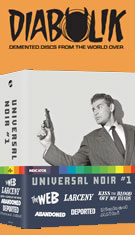
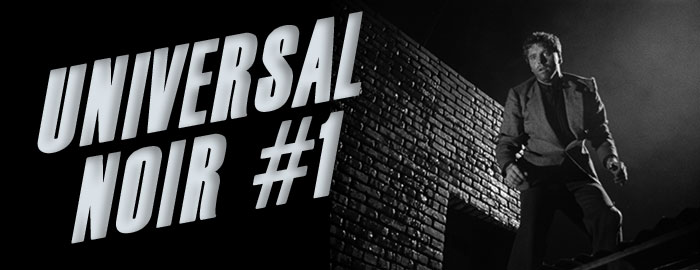


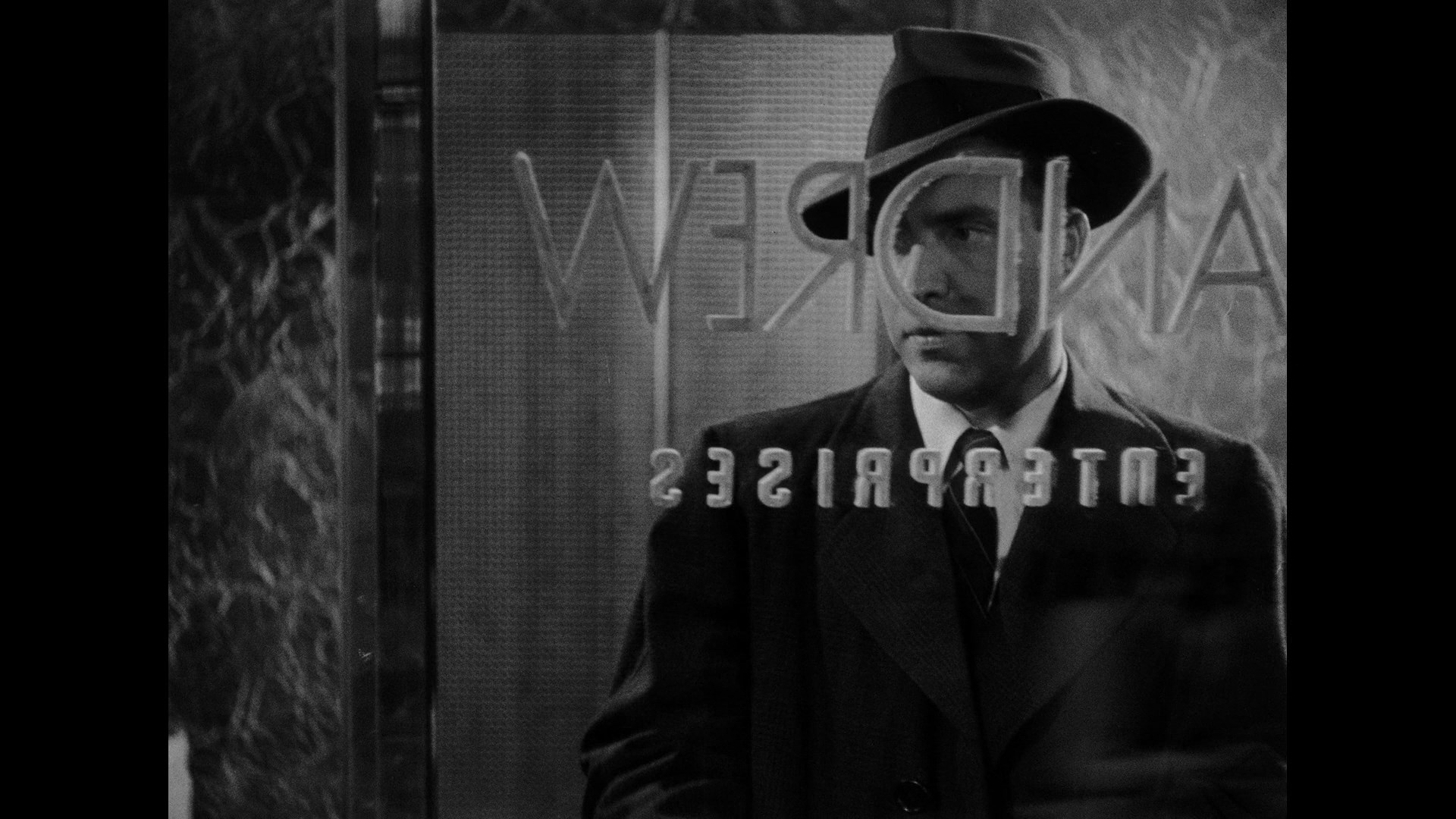 Blu-ray sets devoted to the film noir output of Columbia, Indicator is shifting gears to Universal with a
Blu-ray sets devoted to the film noir output of Columbia, Indicator is shifting gears to Universal with a 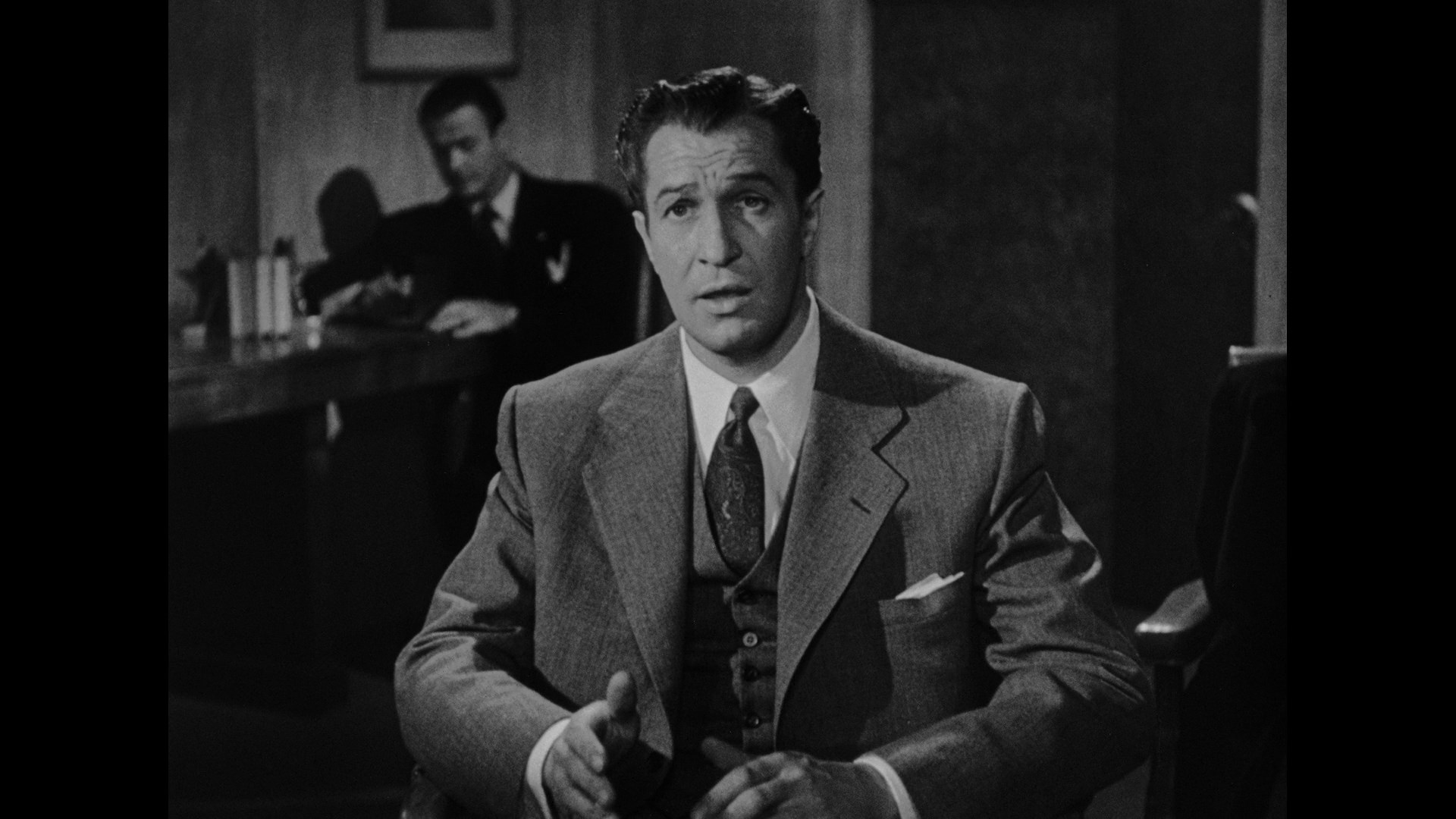 distinctly different set of offerings from the '40s and '50s. The Universal noir touch is a little glossier by comparison with a different stable of stars, and in the limited edition Universal Noir #1 released in 2022, you get a stacked set of six titles with a solid representation of the house style in the years following World War II. Limited to 6,000 units, the box also comes with a 120-page book featuring essays by Iris Veysey, Jill Blake, Karen Burroughs Hannsberry, Sabina Stent, Sergio Angelini, and Walter Chaw, plus the usual credits, archival essays and reviews, and photos.
distinctly different set of offerings from the '40s and '50s. The Universal noir touch is a little glossier by comparison with a different stable of stars, and in the limited edition Universal Noir #1 released in 2022, you get a stacked set of six titles with a solid representation of the house style in the years following World War II. Limited to 6,000 units, the box also comes with a 120-page book featuring essays by Iris Veysey, Jill Blake, Karen Burroughs Hannsberry, Sabina Stent, Sergio Angelini, and Walter Chaw, plus the usual credits, archival essays and reviews, and photos. 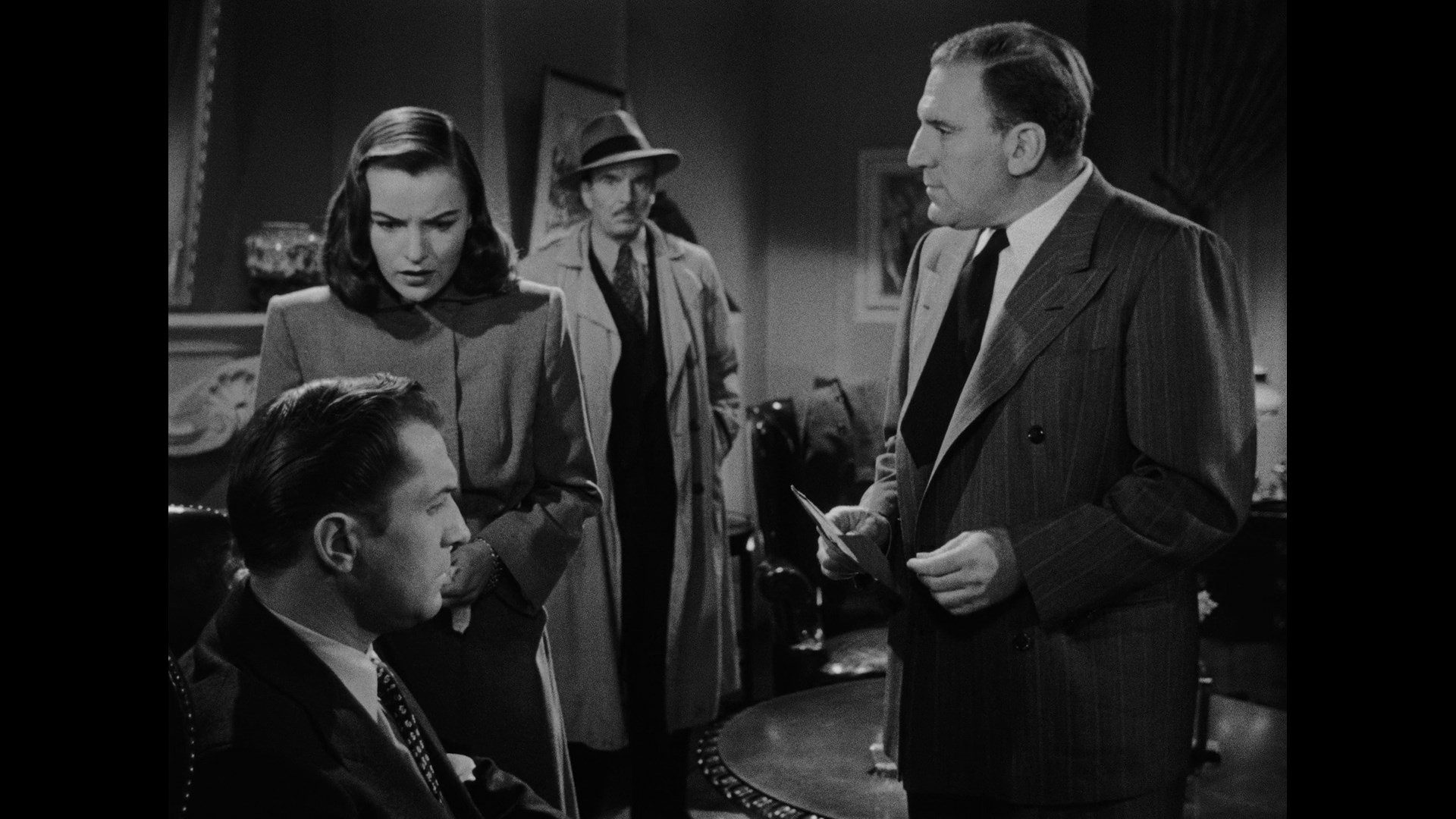 fits the bill 100%
fits the bill 100% 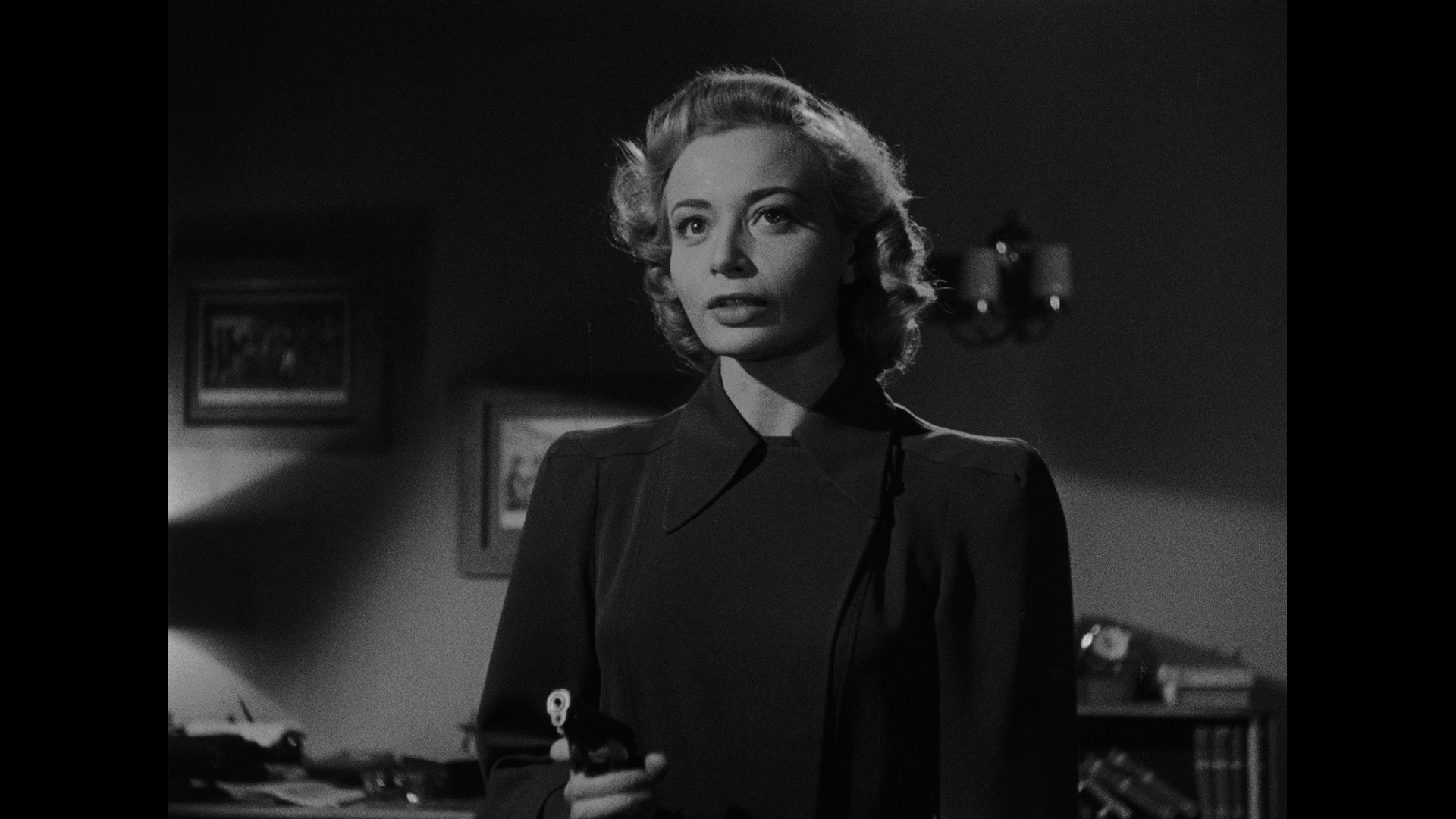 and is absolutely worth seeing for its crackling cast and the usual perverse subtext lurking just under the surface.
and is absolutely worth seeing for its crackling cast and the usual perverse subtext lurking just under the surface.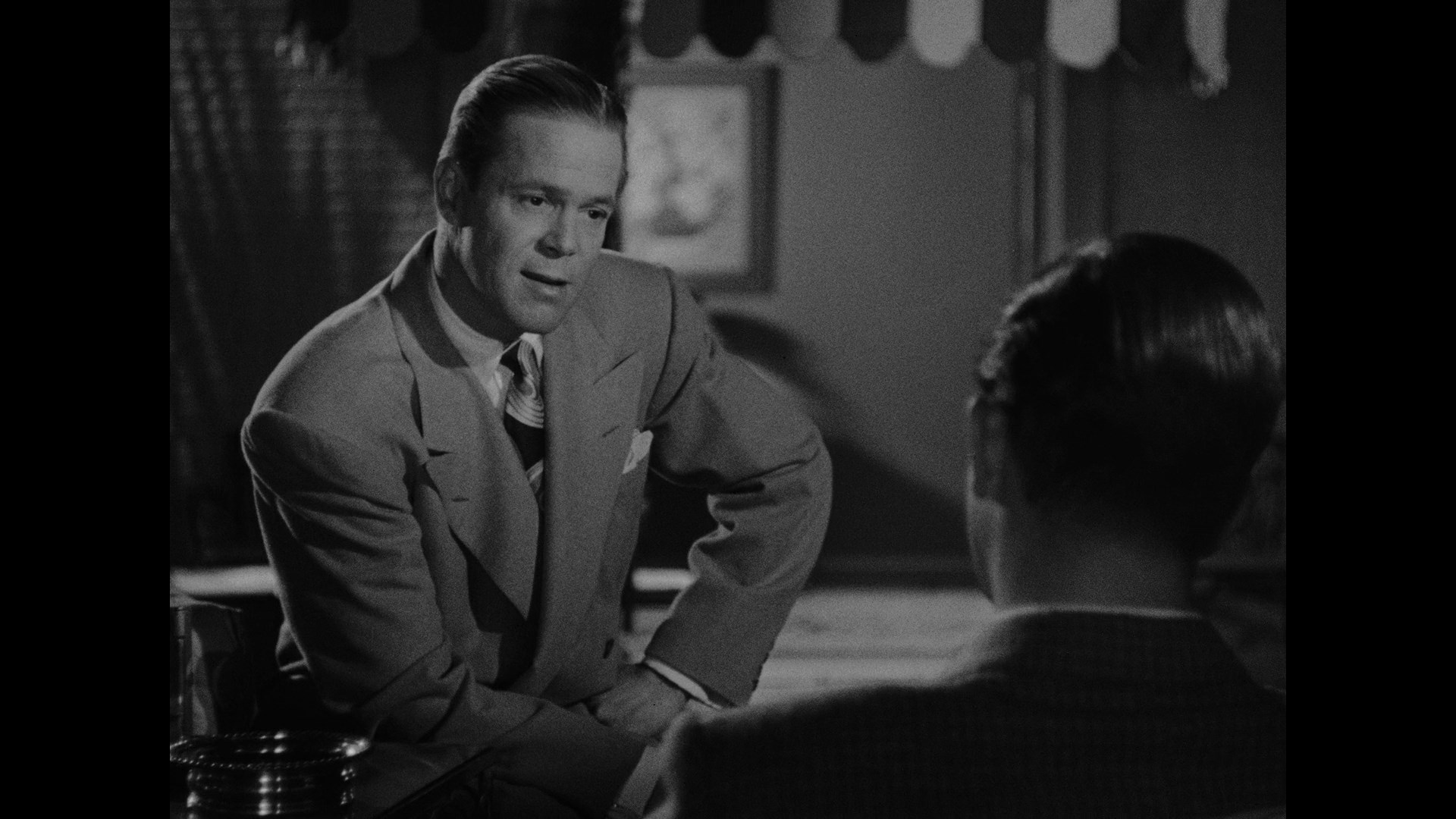 Ladd, Betty Hutton, and ridiculously
Ladd, Betty Hutton, and ridiculously 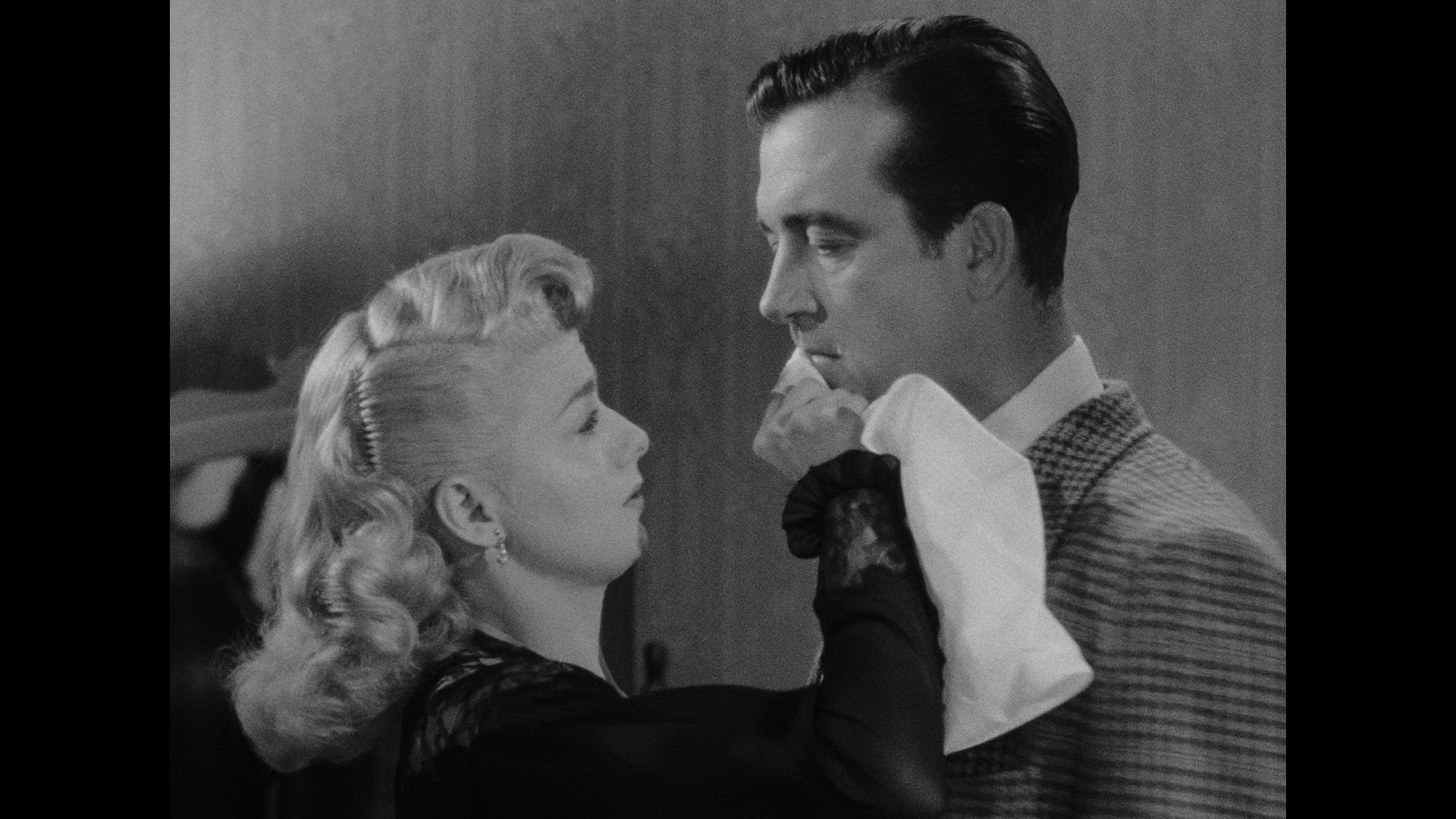 young Susan Hayward demonstrating how to make good use of your war bonds.
young Susan Hayward demonstrating how to make good use of your war bonds. 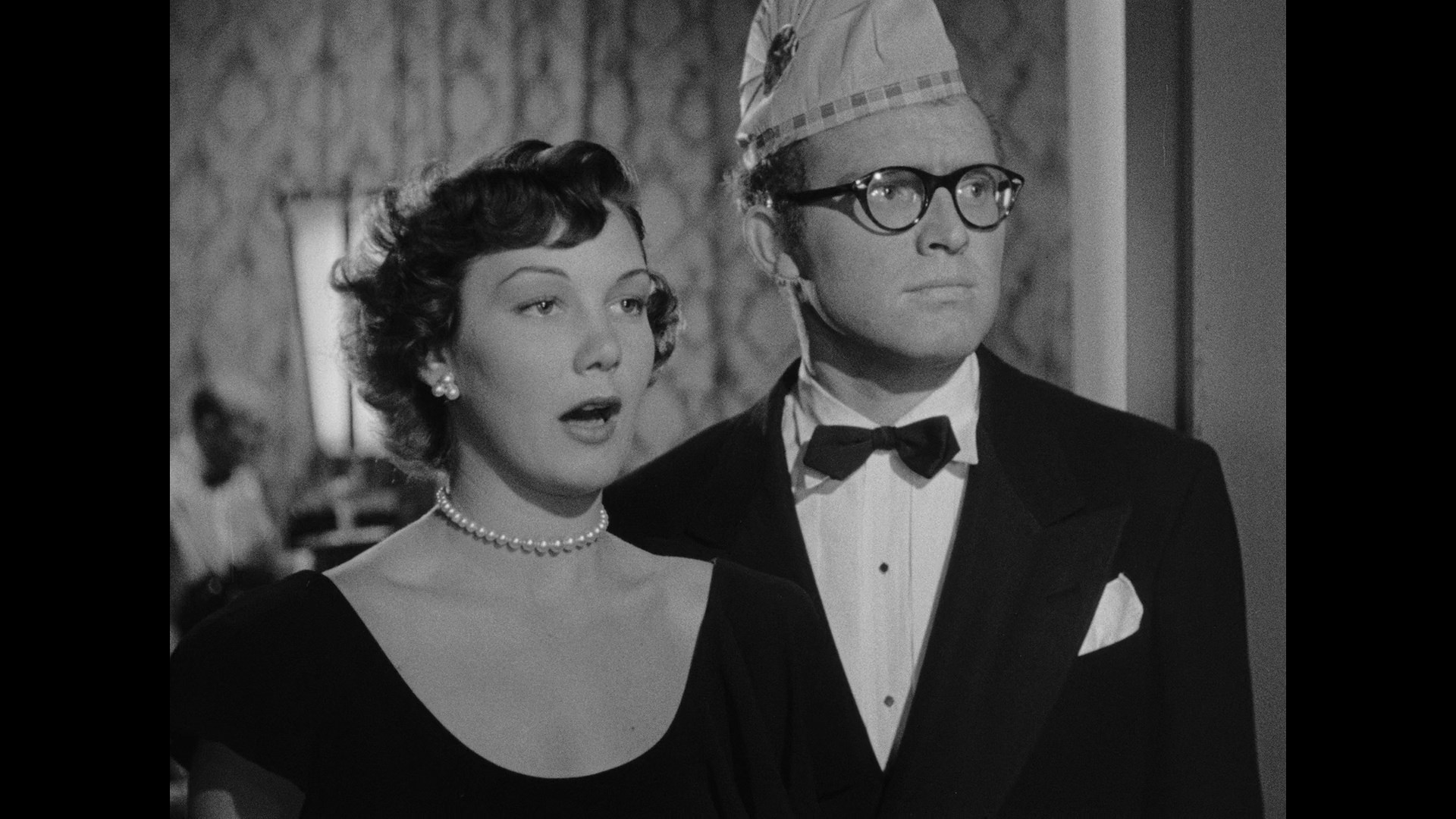 Duryea and Winters who really crackle every second they're in front of the camera. The material with bland as skim milk
Duryea and Winters who really crackle every second they're in front of the camera. The material with bland as skim milk 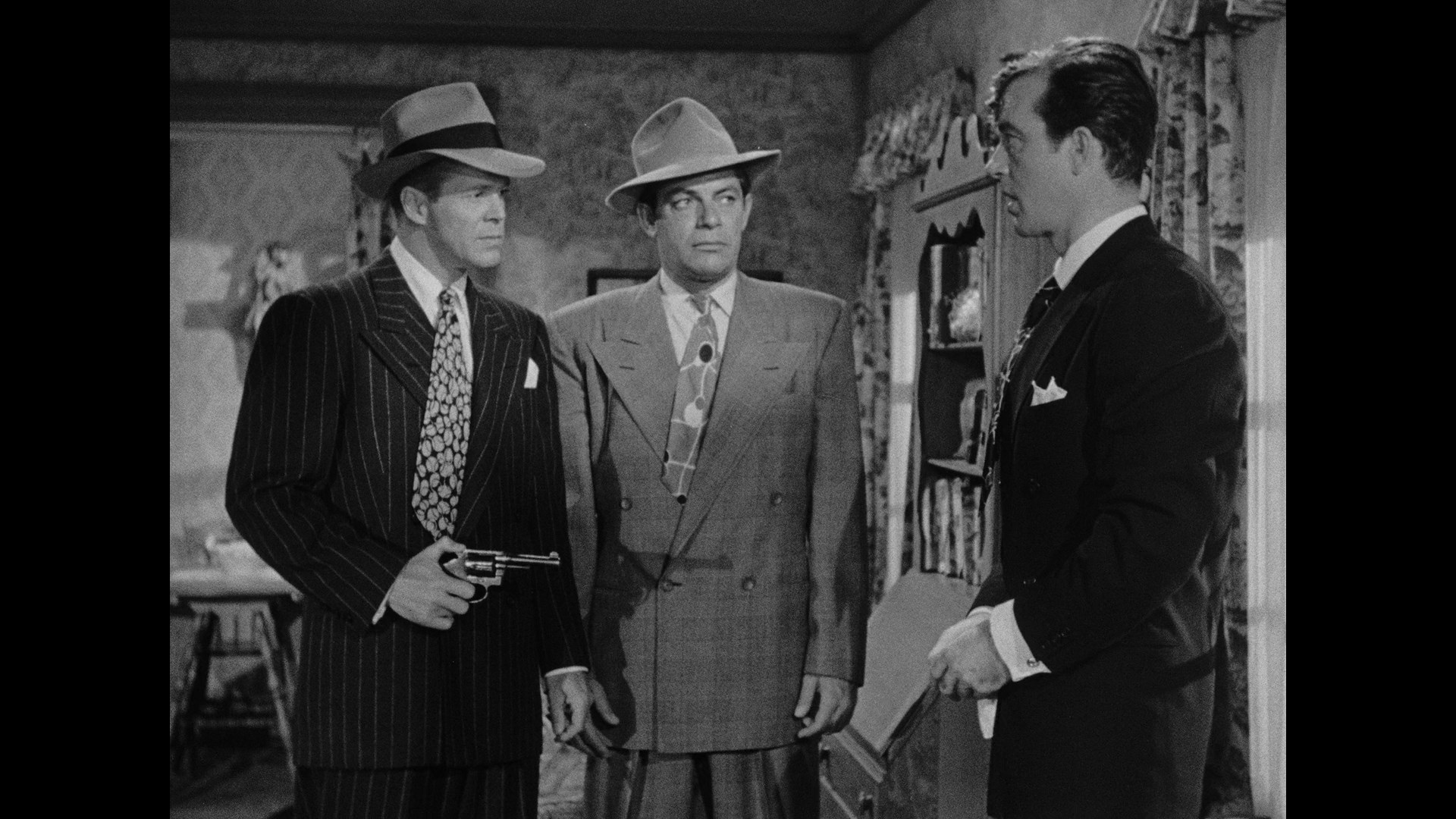 Payne and Caulfield is obviously less electrifying, but they do okay with what they have and do get a few zingers here and there. Like the prior title, this one was tricky to see outside of TV airings until a 2021 Blu-ray from Kino Lorber (featuring the trailer and a commentary by Eddy Von Mueller). The Indicator disc switches things out with a new track by Eloise Ross, who does an incisive job of tackling the film's post-war analysis of patriotism and its exploitation as well as the depiction of small town sensibilities as ripe for targets like our antiheroes. In "The Heel with Sex Appeal" (29m1s), Nick Pinkerton examines the unique screen presence of the star created by his unique vocal delivery and how he compared to other breakthrough stars of the noir golden age. A 27-image gallery is also included. The film itself looks great apart from some age-related scuffs here and there, taken from a 4K scan made in 2017.
Payne and Caulfield is obviously less electrifying, but they do okay with what they have and do get a few zingers here and there. Like the prior title, this one was tricky to see outside of TV airings until a 2021 Blu-ray from Kino Lorber (featuring the trailer and a commentary by Eddy Von Mueller). The Indicator disc switches things out with a new track by Eloise Ross, who does an incisive job of tackling the film's post-war analysis of patriotism and its exploitation as well as the depiction of small town sensibilities as ripe for targets like our antiheroes. In "The Heel with Sex Appeal" (29m1s), Nick Pinkerton examines the unique screen presence of the star created by his unique vocal delivery and how he compared to other breakthrough stars of the noir golden age. A 27-image gallery is also included. The film itself looks great apart from some age-related scuffs here and there, taken from a 4K scan made in 2017. 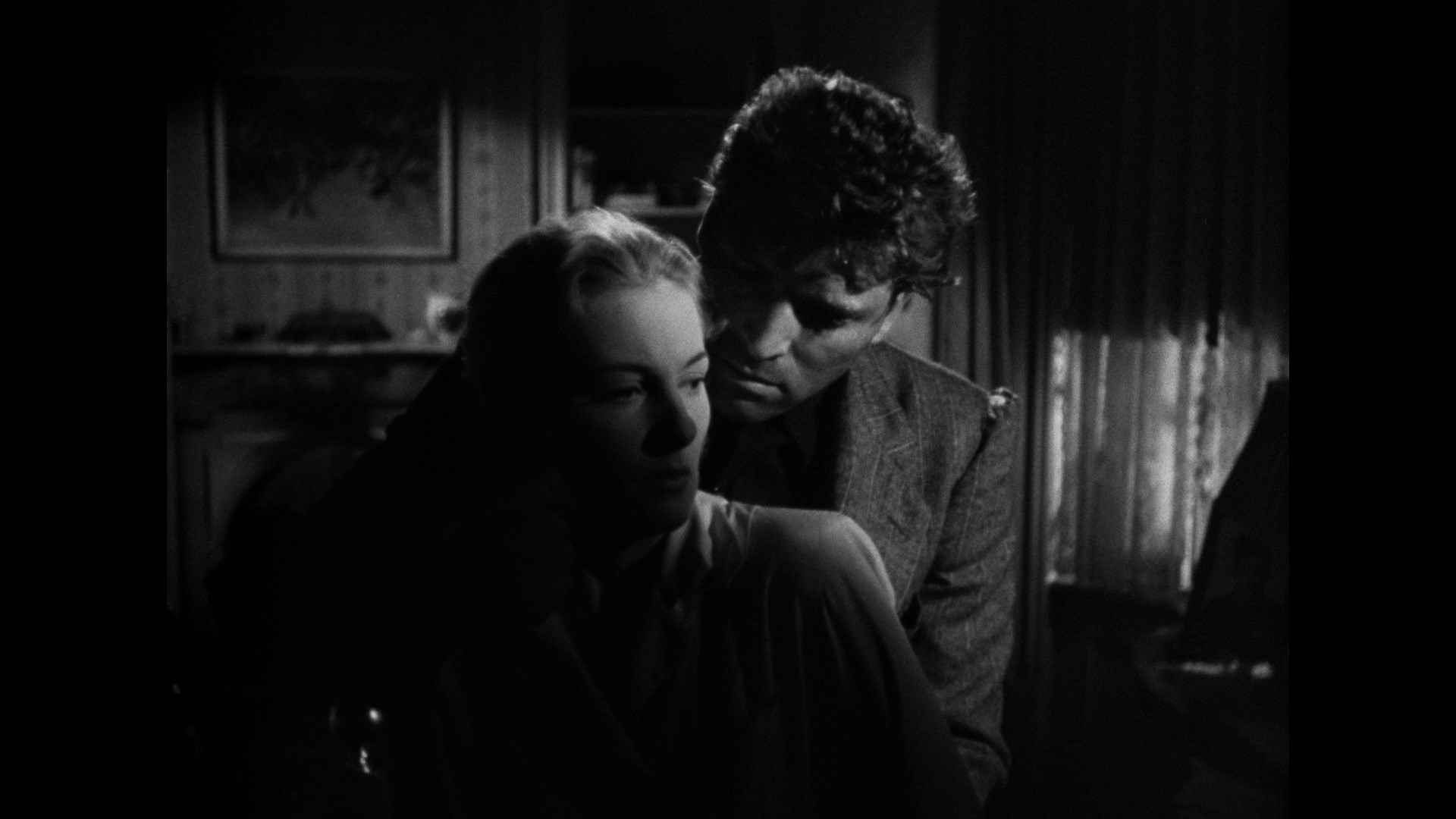
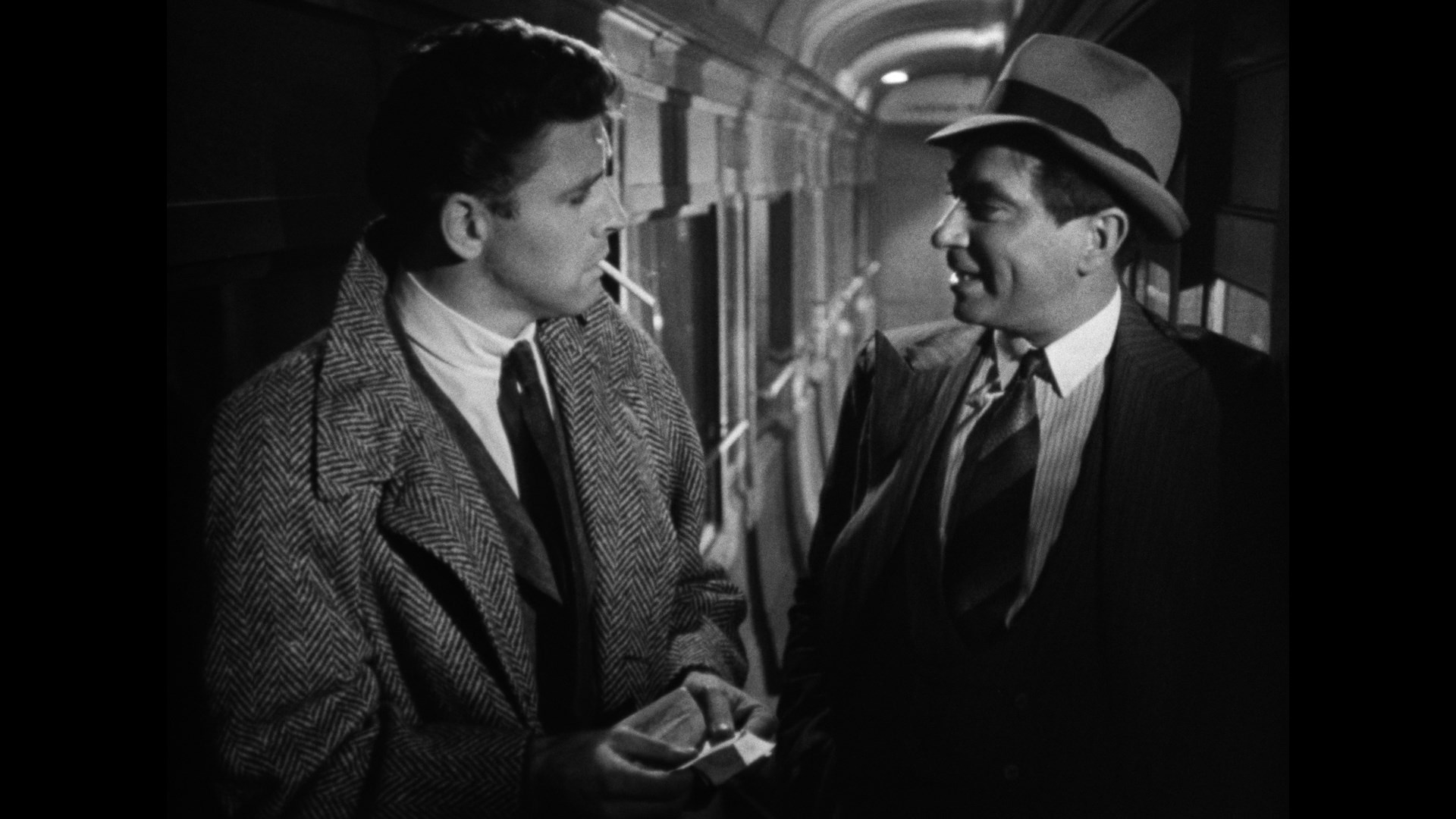 Boasting one of the pulpiest titles in the noir pantheon, Kiss the Blood Off My Hands is a very different study of postwar recovery (or lack thereof) here against the backdrop of late '40s London (though shot in L.A.). It's a very high pedigree production all around shot by Universal's ace cinematographer Russell Metty (with art direction by Nathan Juran before he became a director) and sporting a dramatic score by Miklos Rozsa. The film begins by informing us "The cities can be rebuilt, but the wounds of men, whether of the mind or of the body, heal slowly," which is promptly demonstrated as hard-drinking vet and onetime P.O.W. Bill Saunders (Lancaster) fatally shoves a guy to the ground during a pub altercation. On the run, he takes refuge in the apartment of nurse Jane Wharton (Fontaine), who ends up falling for him. Various quirks of fate follow as she sticks with him through an extortion attempt by crook Harry Carter (Newton) to get Bill to pull off a drug transport robbery.
Boasting one of the pulpiest titles in the noir pantheon, Kiss the Blood Off My Hands is a very different study of postwar recovery (or lack thereof) here against the backdrop of late '40s London (though shot in L.A.). It's a very high pedigree production all around shot by Universal's ace cinematographer Russell Metty (with art direction by Nathan Juran before he became a director) and sporting a dramatic score by Miklos Rozsa. The film begins by informing us "The cities can be rebuilt, but the wounds of men, whether of the mind or of the body, heal slowly," which is promptly demonstrated as hard-drinking vet and onetime P.O.W. Bill Saunders (Lancaster) fatally shoves a guy to the ground during a pub altercation. On the run, he takes refuge in the apartment of nurse Jane Wharton (Fontaine), who ends up falling for him. Various quirks of fate follow as she sticks with him through an extortion attempt by crook Harry Carter (Newton) to get Bill to pull off a drug transport robbery.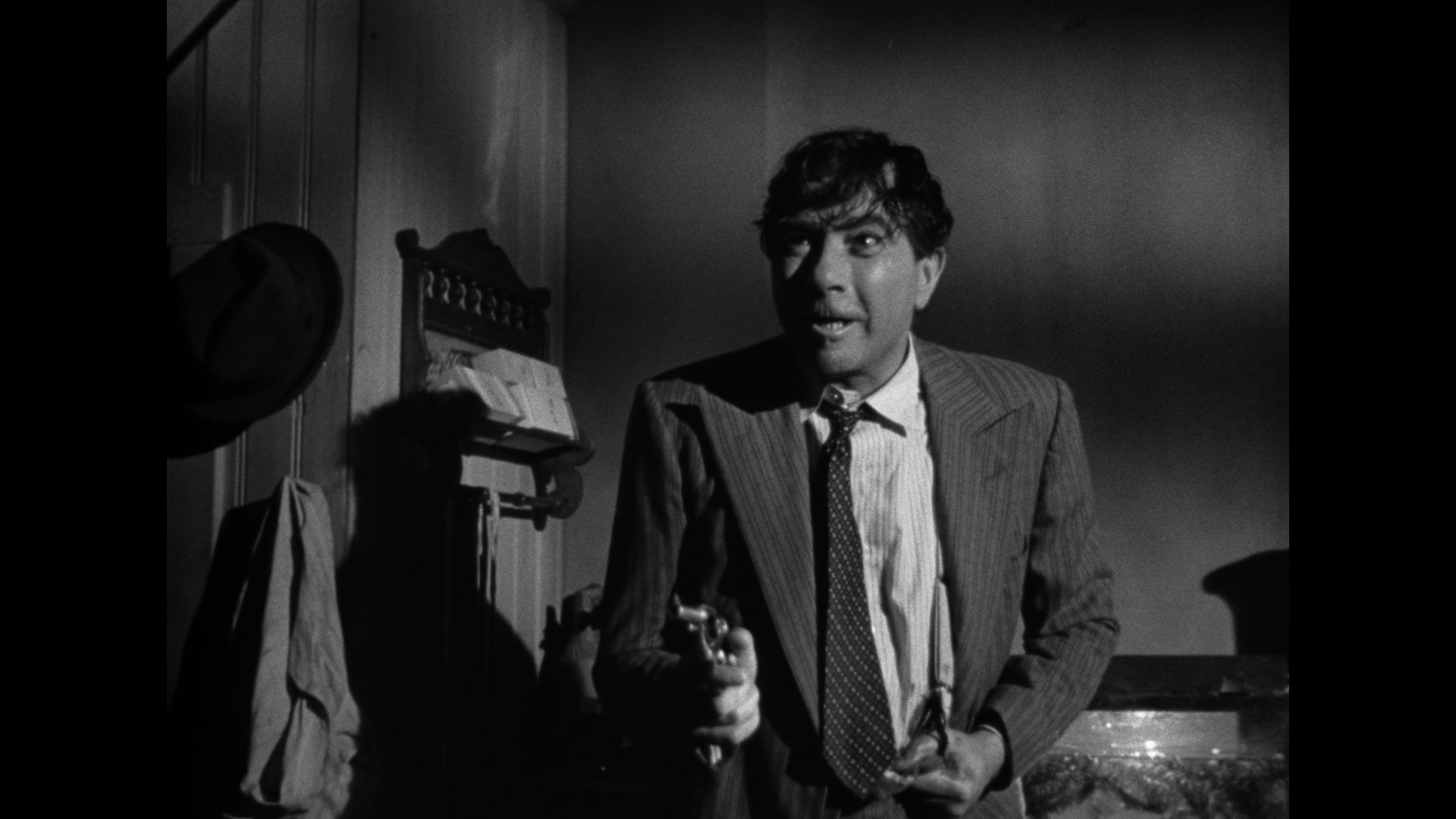 The two stars couldn't deliver bad performances if they tried (Fontaine already had an Oscar,
The two stars couldn't deliver bad performances if they tried (Fontaine already had an Oscar, 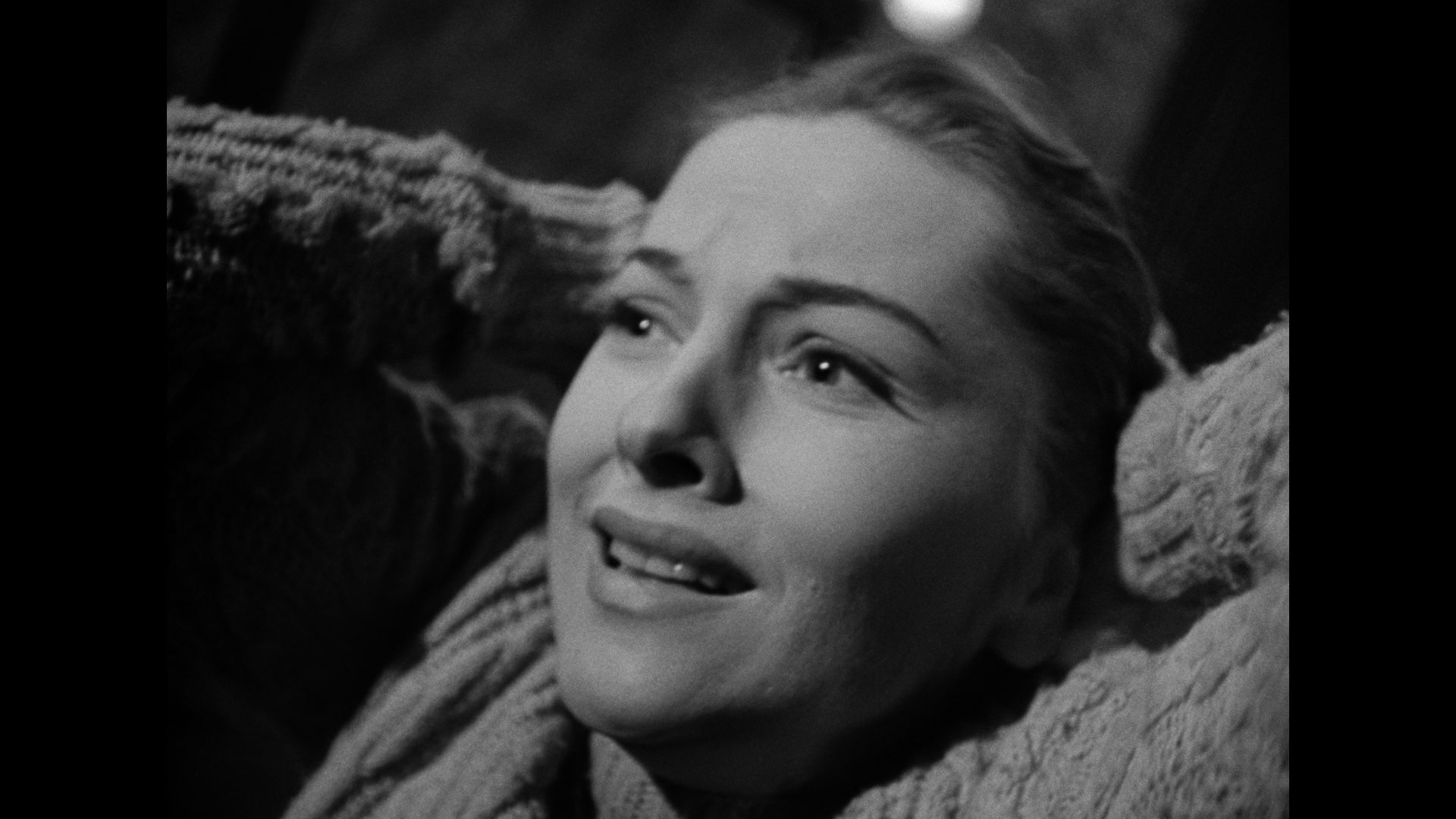 and Lancaster would get one soon enough), and they do good work here with a story that zigs and zags in some odd directions at times. Fairly successful at the time but mostly sidelined after that given Lancaster's much bigger later productions, the film was a TV fixture now and then but never received an official home video release of any kind until a halfhearted DVD-R MOD edition from Universal. Much better was 2020 Blu-ray from Kino Lorber, which came with a trailer and an audio commentary by Jeremy Arnold. The Indicator Blu-ray, taken from the same 2019 2K scan and looking very good throughout, sports a new Josh Nelson commentary analyzing the film's depiction of trauma, its recurring imprisonment imagery, the creation of anxiety through its aesthetic choices, and differences from the Gerald Butler source novel. A 1978 " The John Player Lecture with Joan Fontaine" runs for 63 minutes as an alternate audio track to the main feature, with the legend chatting with critic Martin Shawcross at London’s National Film Theatre about her aversion to watching her completed films, her adventures in Hollywood and England, and encounters with other actors along the way. She's in a great mood here and quite funny, making it a breezy and entertaining listen. One of this film's screenwriters, Ben Maddow, is represented with United Action Means Victory (36m11s), a 1939 documentary short about the then-current General Motors strike depicting the importance and negotiating power of unions on the public stage. Also included are the original trailer and a 38-imagegallery.
and Lancaster would get one soon enough), and they do good work here with a story that zigs and zags in some odd directions at times. Fairly successful at the time but mostly sidelined after that given Lancaster's much bigger later productions, the film was a TV fixture now and then but never received an official home video release of any kind until a halfhearted DVD-R MOD edition from Universal. Much better was 2020 Blu-ray from Kino Lorber, which came with a trailer and an audio commentary by Jeremy Arnold. The Indicator Blu-ray, taken from the same 2019 2K scan and looking very good throughout, sports a new Josh Nelson commentary analyzing the film's depiction of trauma, its recurring imprisonment imagery, the creation of anxiety through its aesthetic choices, and differences from the Gerald Butler source novel. A 1978 " The John Player Lecture with Joan Fontaine" runs for 63 minutes as an alternate audio track to the main feature, with the legend chatting with critic Martin Shawcross at London’s National Film Theatre about her aversion to watching her completed films, her adventures in Hollywood and England, and encounters with other actors along the way. She's in a great mood here and quite funny, making it a breezy and entertaining listen. One of this film's screenwriters, Ben Maddow, is represented with United Action Means Victory (36m11s), a 1939 documentary short about the then-current General Motors strike depicting the importance and negotiating power of unions on the public stage. Also included are the original trailer and a 38-imagegallery. 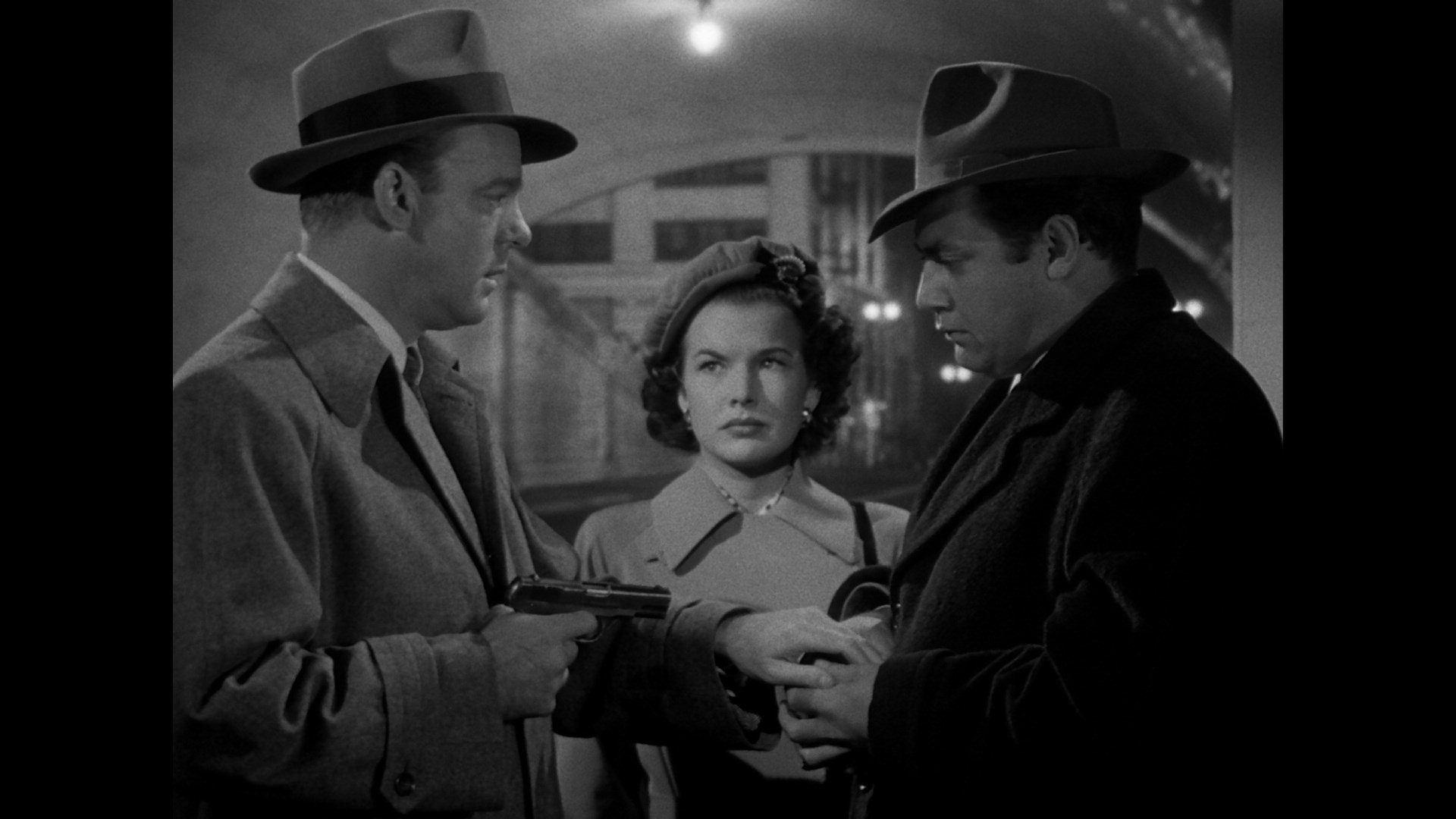 Another underseen noir, Abandoned was very much under the radar
Another underseen noir, Abandoned was very much under the radar 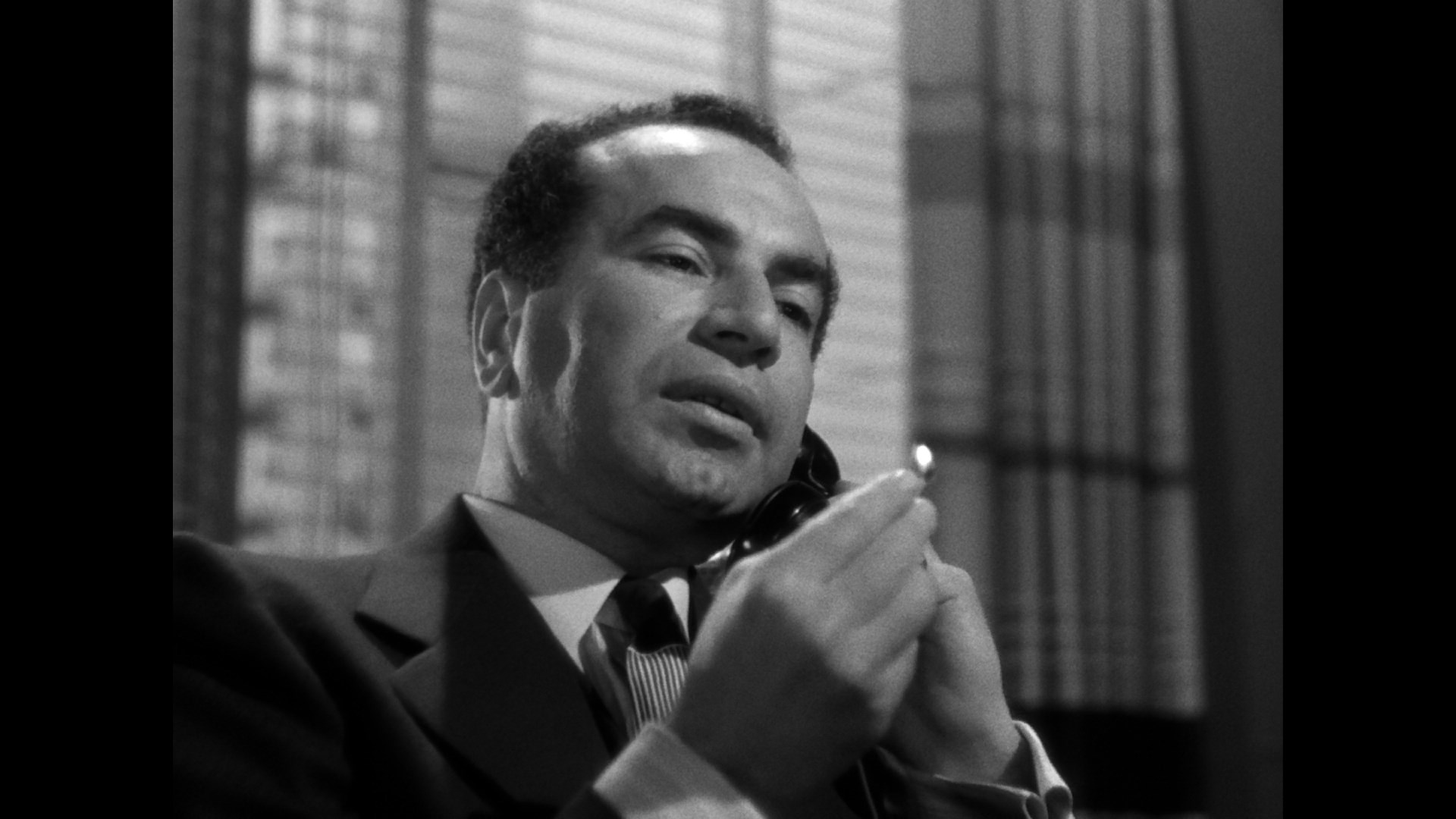 of most until it turned up on Blu-ray from Kino Lorber in 2020 as part of Film Noir:The Dark Side of Cinema III packaged with The Lady Gambles and The Sleeping City (and featuring a trailer and a Samm Deighan commentary). Making excellent use of real Los Angeles locations, it's a quick and energetic thriller about the attempts of Paula Consodine (Storm) who hops right off a bus to the City of Angels in search of her missing sister, who's just given birth out of wedlock. While filling a missing persons report she attracts the interest of reporter Mark Sitko (O'Keefe), which leads to the D.A., McRae (Universal stable member Chandler) who's working on a black market baby ring. Added to the mix is shady private eye Kerric (Burr), who's been hired by Paula's father to shadow her and find out what's really going on-- especially with said sister dead from what seems to be a fake suicide.
of most until it turned up on Blu-ray from Kino Lorber in 2020 as part of Film Noir:The Dark Side of Cinema III packaged with The Lady Gambles and The Sleeping City (and featuring a trailer and a Samm Deighan commentary). Making excellent use of real Los Angeles locations, it's a quick and energetic thriller about the attempts of Paula Consodine (Storm) who hops right off a bus to the City of Angels in search of her missing sister, who's just given birth out of wedlock. While filling a missing persons report she attracts the interest of reporter Mark Sitko (O'Keefe), which leads to the D.A., McRae (Universal stable member Chandler) who's working on a black market baby ring. Added to the mix is shady private eye Kerric (Burr), who's been hired by Paula's father to shadow her and find out what's really going on-- especially with said sister dead from what seems to be a fake suicide. 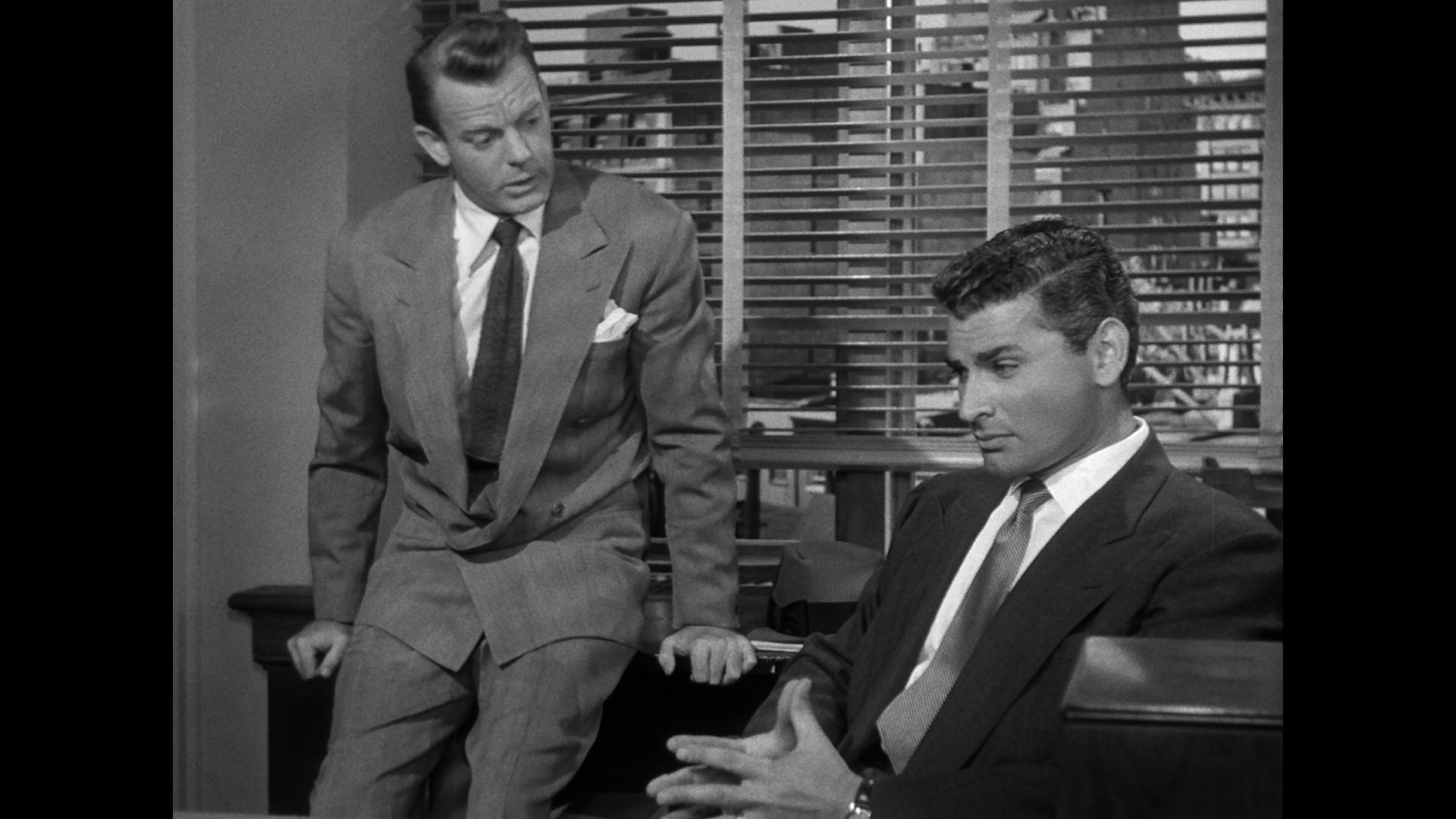 digging deep in the baby broker underworld where she brushes up against troubled unwed mothers of various stripes. It's an interesting angle for a thriller, essentially going as far as possible for a studio feature to touch
digging deep in the baby broker underworld where she brushes up against troubled unwed mothers of various stripes. It's an interesting angle for a thriller, essentially going as far as possible for a studio feature to touch 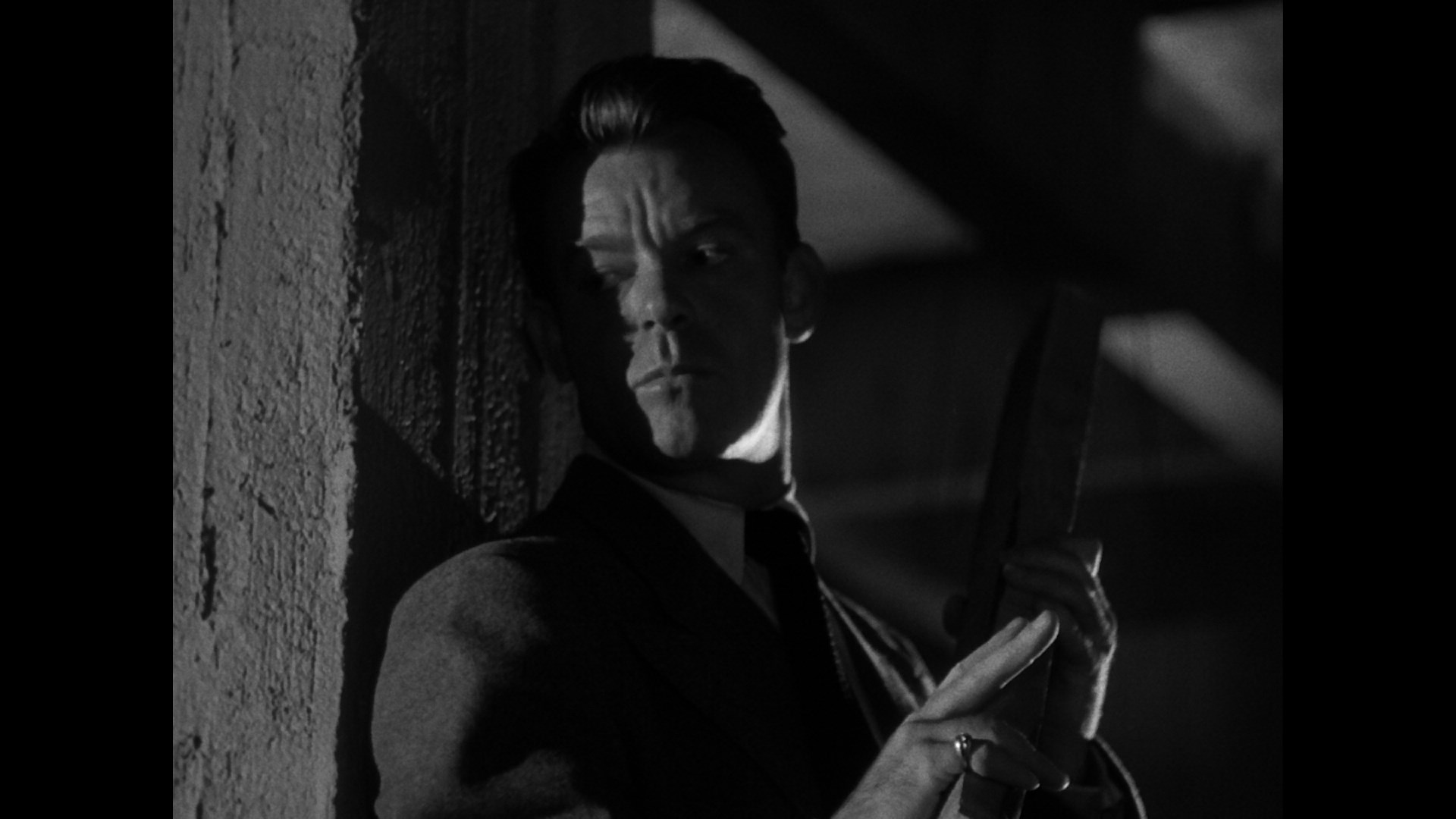 on the whole reproductive and parenthood rights debates as the Production Code would allow at the time. Again the dialogue is more clever than expected in several spots, and while O'Keefe is mostly going through the motions here in a part he played a jillion times, everyone else is in good form here. Featuring the same respectable HD master originally created in 2010, the Indicator disc is well appointed here again, featuring a new commentary by Barry Forshaw and Kim Newman who parse out how much this really falls under the film noir banner, how the performers connect with other crime film and radio productions, what the film bears in relation to real adoption rackets, and what the cast ended up doing later in life. Also included are a 23-image gallery and a short film from this one's director, Joseph M. Newman: Easy to Get (21m47s), a 1947 example of an armed forces warning against the dangers of venereal disease to boys back at home. It's worth watching just for the surreal spectacle of Rear Window actor Wendell Corey saying "You met a dirty woman, and you didn't use a rubber" and "Sure, he knew she was a whore. So what!" The required shots of healthy and diseased dongs are likely responsible for the set's "12" rating, so sit your preteens down and
on the whole reproductive and parenthood rights debates as the Production Code would allow at the time. Again the dialogue is more clever than expected in several spots, and while O'Keefe is mostly going through the motions here in a part he played a jillion times, everyone else is in good form here. Featuring the same respectable HD master originally created in 2010, the Indicator disc is well appointed here again, featuring a new commentary by Barry Forshaw and Kim Newman who parse out how much this really falls under the film noir banner, how the performers connect with other crime film and radio productions, what the film bears in relation to real adoption rackets, and what the cast ended up doing later in life. Also included are a 23-image gallery and a short film from this one's director, Joseph M. Newman: Easy to Get (21m47s), a 1947 example of an armed forces warning against the dangers of venereal disease to boys back at home. It's worth watching just for the surreal spectacle of Rear Window actor Wendell Corey saying "You met a dirty woman, and you didn't use a rubber" and "Sure, he knew she was a whore. So what!" The required shots of healthy and diseased dongs are likely responsible for the set's "12" rating, so sit your preteens down and 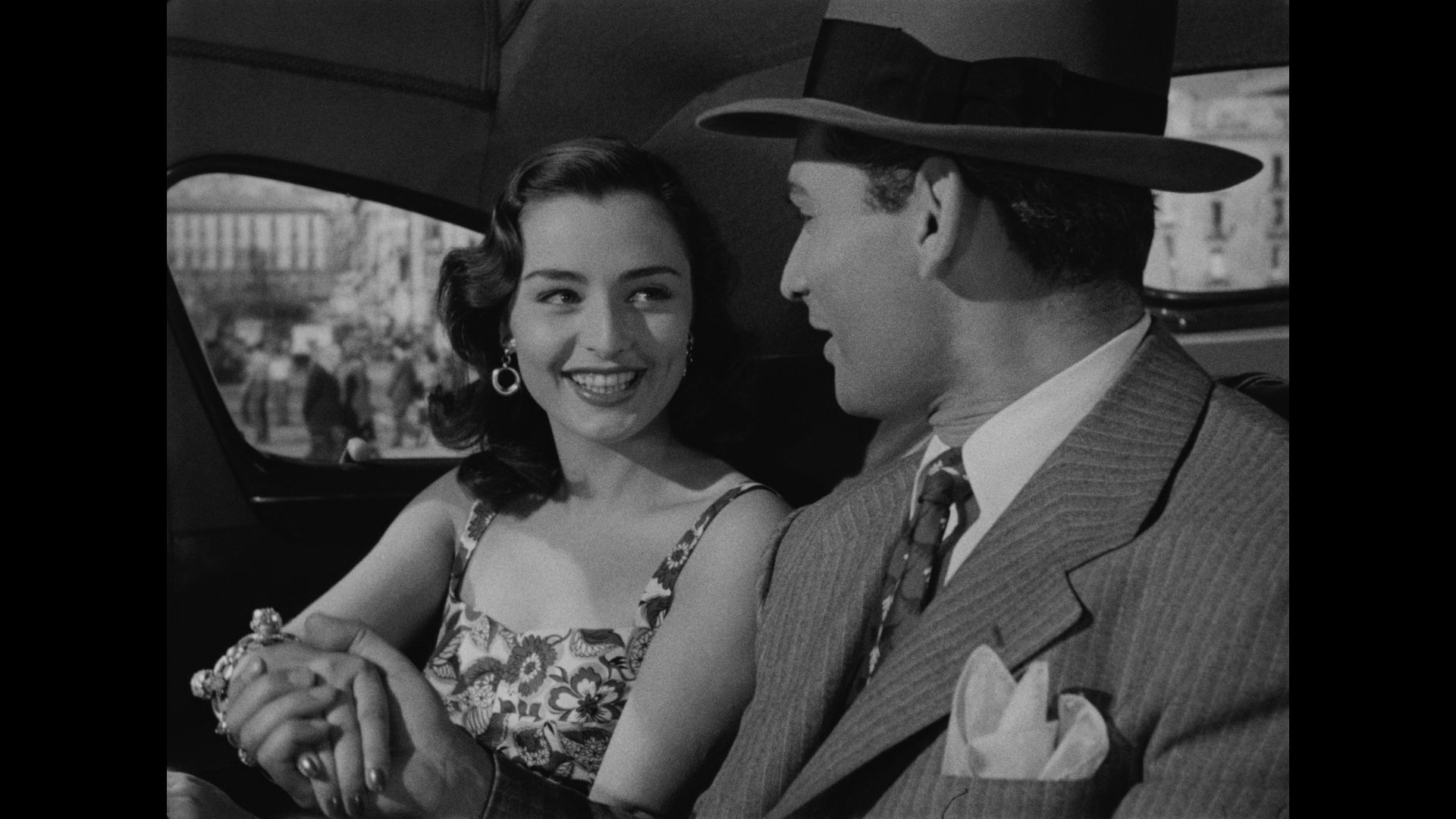 enjoy.
enjoy. Then we're off to Naples where Chandler is back in a more of a bona fide leading role in Deported, which is more of a travelogue gangster film than a traditional noir. It's still great to have though as it gives Chandler a sturdy vehicle as Vittorio, a mob boss (very openly modeled on Lucky Luciano) shipped off from America to Italy. There he poses as an American government worker while hanging out with his uncle, eating great Neapolitan food, finding possible romance with a countess (Torén), and possibly resuming his criminal activities in a new setting. Clearly inspired by recent successful imports by the likes of Roberto Rossellini, this one is highlighted by extensive on-location shooting, capturing Southern Italy recovering five years after the fall of fascism and on the cusp of becoming a major force in international cinema. The direction by noir vet Robert Siodmak is much more grounded and earthy than his more famous pure noirs, including titles like Criss Cross, Phantom Lady, The Dark Mirror, The Killers,
Then we're off to Naples where Chandler is back in a more of a bona fide leading role in Deported, which is more of a travelogue gangster film than a traditional noir. It's still great to have though as it gives Chandler a sturdy vehicle as Vittorio, a mob boss (very openly modeled on Lucky Luciano) shipped off from America to Italy. There he poses as an American government worker while hanging out with his uncle, eating great Neapolitan food, finding possible romance with a countess (Torén), and possibly resuming his criminal activities in a new setting. Clearly inspired by recent successful imports by the likes of Roberto Rossellini, this one is highlighted by extensive on-location shooting, capturing Southern Italy recovering five years after the fall of fascism and on the cusp of becoming a major force in international cinema. The direction by noir vet Robert Siodmak is much more grounded and earthy than his more famous pure noirs, including titles like Criss Cross, Phantom Lady, The Dark Mirror, The Killers, 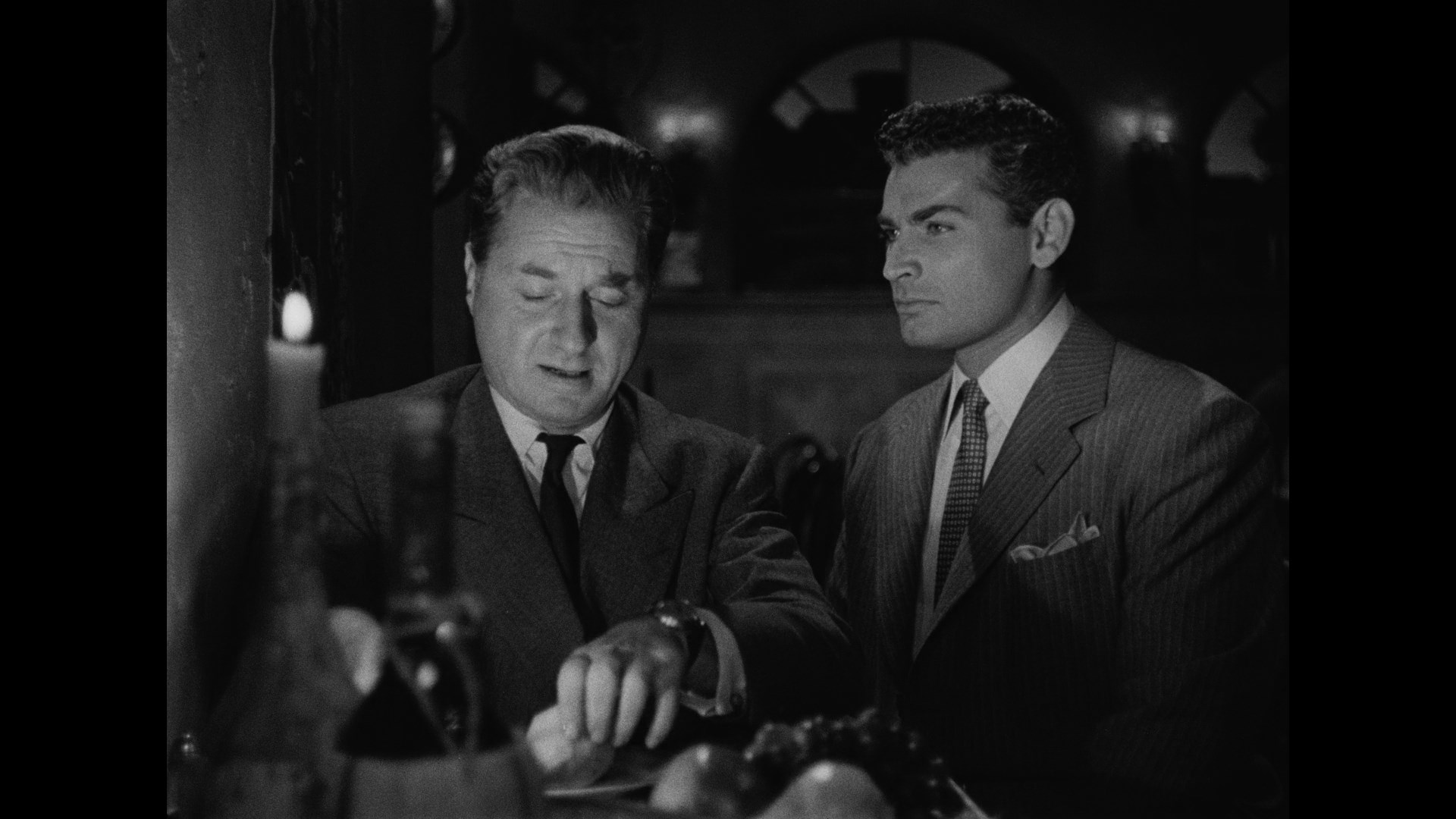 and the horror-noir hybrid The Spiral Staircase.
and the horror-noir hybrid The Spiral Staircase.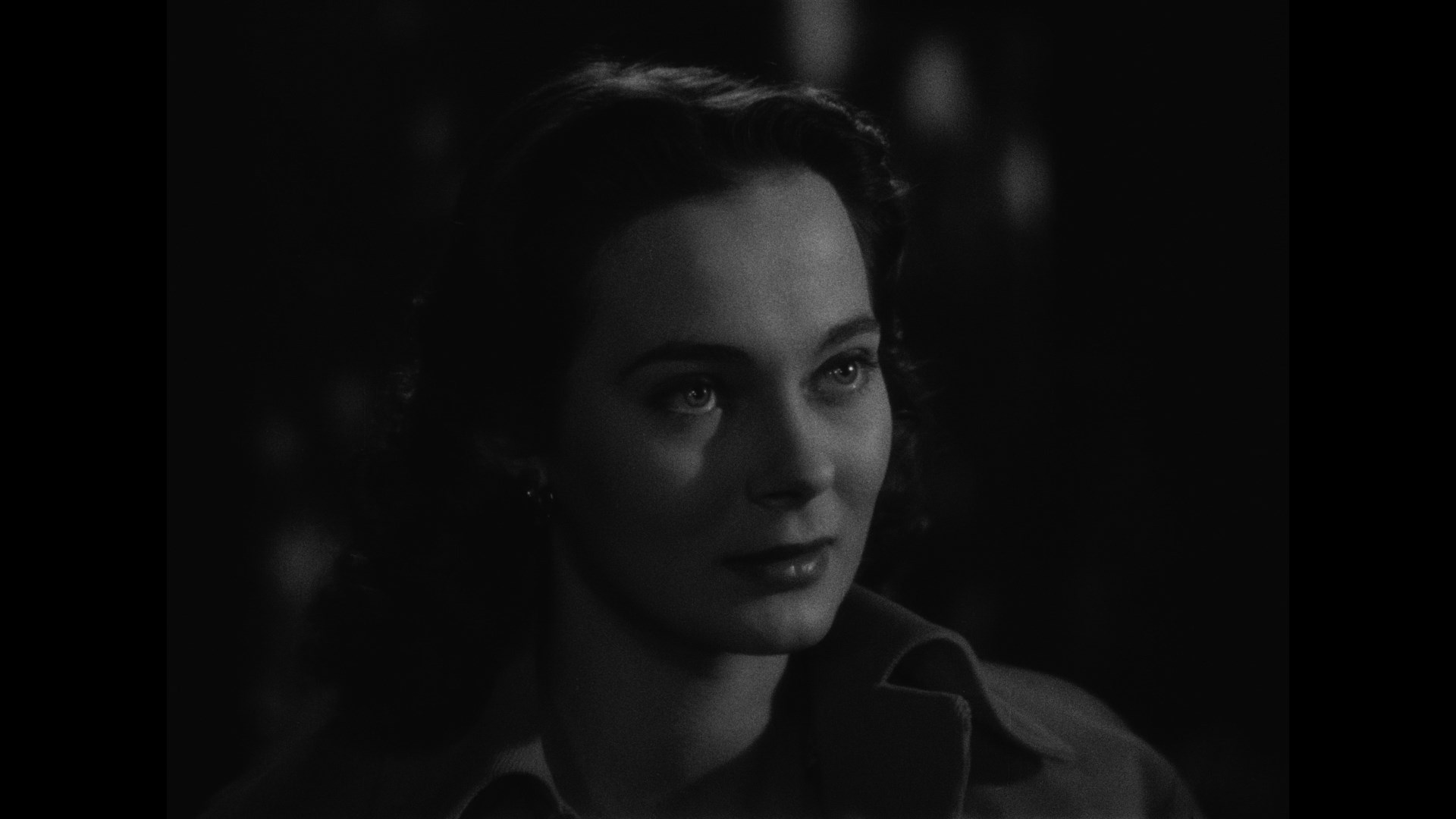 Kino Lorber, which came with the trailer and a commentary by Eddy Von Mueller. The 4K scan commissioned in 2017 looks terrific, especially the bright outdoor scenes showing off the Naples scenery. A new commentary by filmmaker Daniel Kremer is extremely thorough as he points out uncredited actors, goes into Siodmak's career here at the end of his Hollywood stretch, notes the significance of having a Jewish leading man and director, and draws parallels to other significant films around the time as well as the international political climate. In " Return to Europe" (10m28s), writer Christina Newland focuses on Siodmak and how his European background informed his work in the U.S. where he ended up making a kind of hybrid cinema. 1944's A Salute to France (35m54s) is essentially a propaganda film in support of the French resistance commissioned by the Office of War Information; co-directed by Garson Kanin and Jean Renoir (with a young Burgess Meredith starring as the de facto American ally stand-in), it's relevant here through the inclusion of Deported co-star Claude Dauphin. A 20-image gallery is also included.
Kino Lorber, which came with the trailer and a commentary by Eddy Von Mueller. The 4K scan commissioned in 2017 looks terrific, especially the bright outdoor scenes showing off the Naples scenery. A new commentary by filmmaker Daniel Kremer is extremely thorough as he points out uncredited actors, goes into Siodmak's career here at the end of his Hollywood stretch, notes the significance of having a Jewish leading man and director, and draws parallels to other significant films around the time as well as the international political climate. In " Return to Europe" (10m28s), writer Christina Newland focuses on Siodmak and how his European background informed his work in the U.S. where he ended up making a kind of hybrid cinema. 1944's A Salute to France (35m54s) is essentially a propaganda film in support of the French resistance commissioned by the Office of War Information; co-directed by Garson Kanin and Jean Renoir (with a young Burgess Meredith starring as the de facto American ally stand-in), it's relevant here through the inclusion of Deported co-star Claude Dauphin. A 20-image gallery is also included. 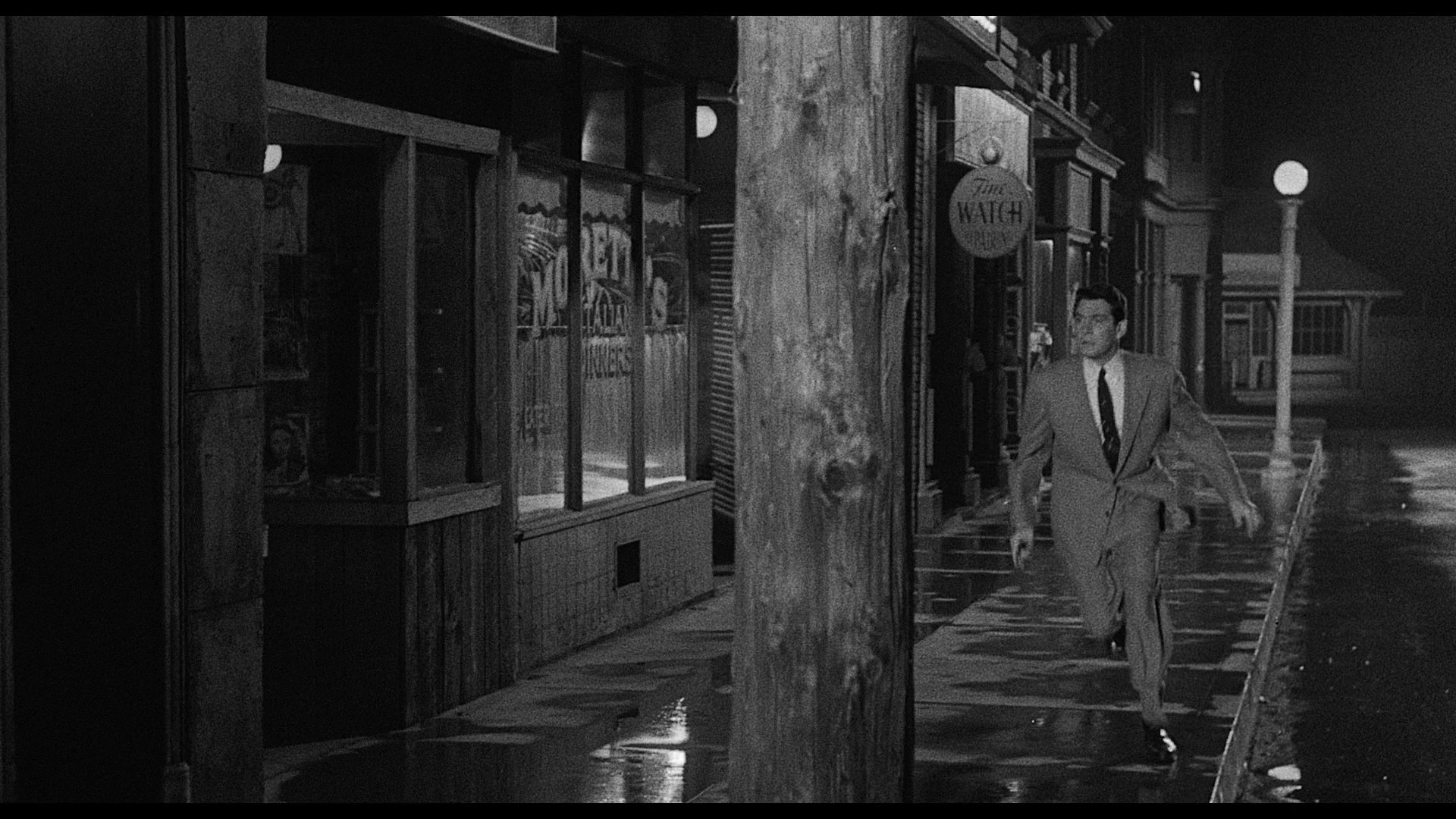 is the most noir-drenched title of the set, Naked Alibi, a sweaty and seething thriller with Sterling Hayden (The Killing) and noir queen Gloria
is the most noir-drenched title of the set, Naked Alibi, a sweaty and seething thriller with Sterling Hayden (The Killing) and noir queen Gloria 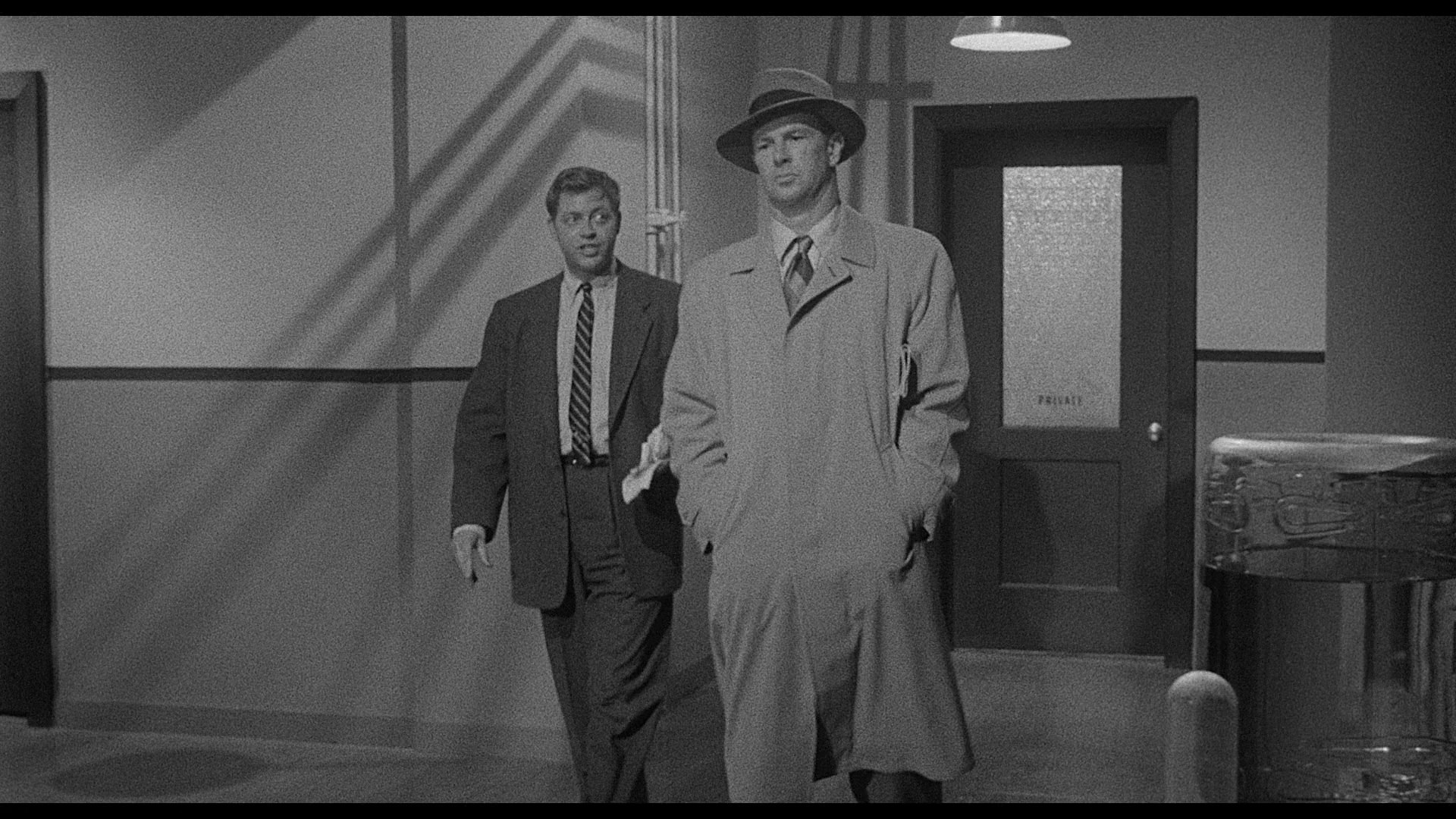 Grahame (The Big Heat) with a roster of '50s Universal heavy hitters aboard like producer Ross Hunter (Imitation of Life, Pillow Talk), cinematographer Russell Metty again, and insanely busy production designer Alexander Golitzen whose distinctive touch would define the studio's output well into the '60s. Kind of a forerunner to Touch of Evil (and Kitten with a Whip), it's the South of the Border story of Chief Joe Conroy (Hayden) whose attempts to pin a string of cop killing on hot-tempered suspect Al Willis (War of the Worlds' Barry, playing way against type here) end up getting him kicked off the force. Agitated by the attempts to shake him down, Willis heads to the border where Joe follows him and teams up with Willis' mistress, nightclub singer Marianna (Grahame), to find an incriminating murder weapon: a German Mauser pistol that must be nearby.
Grahame (The Big Heat) with a roster of '50s Universal heavy hitters aboard like producer Ross Hunter (Imitation of Life, Pillow Talk), cinematographer Russell Metty again, and insanely busy production designer Alexander Golitzen whose distinctive touch would define the studio's output well into the '60s. Kind of a forerunner to Touch of Evil (and Kitten with a Whip), it's the South of the Border story of Chief Joe Conroy (Hayden) whose attempts to pin a string of cop killing on hot-tempered suspect Al Willis (War of the Worlds' Barry, playing way against type here) end up getting him kicked off the force. Agitated by the attempts to shake him down, Willis heads to the border where Joe follows him and teams up with Willis' mistress, nightclub singer Marianna (Grahame), to find an incriminating murder weapon: a German Mauser pistol that must be nearby. 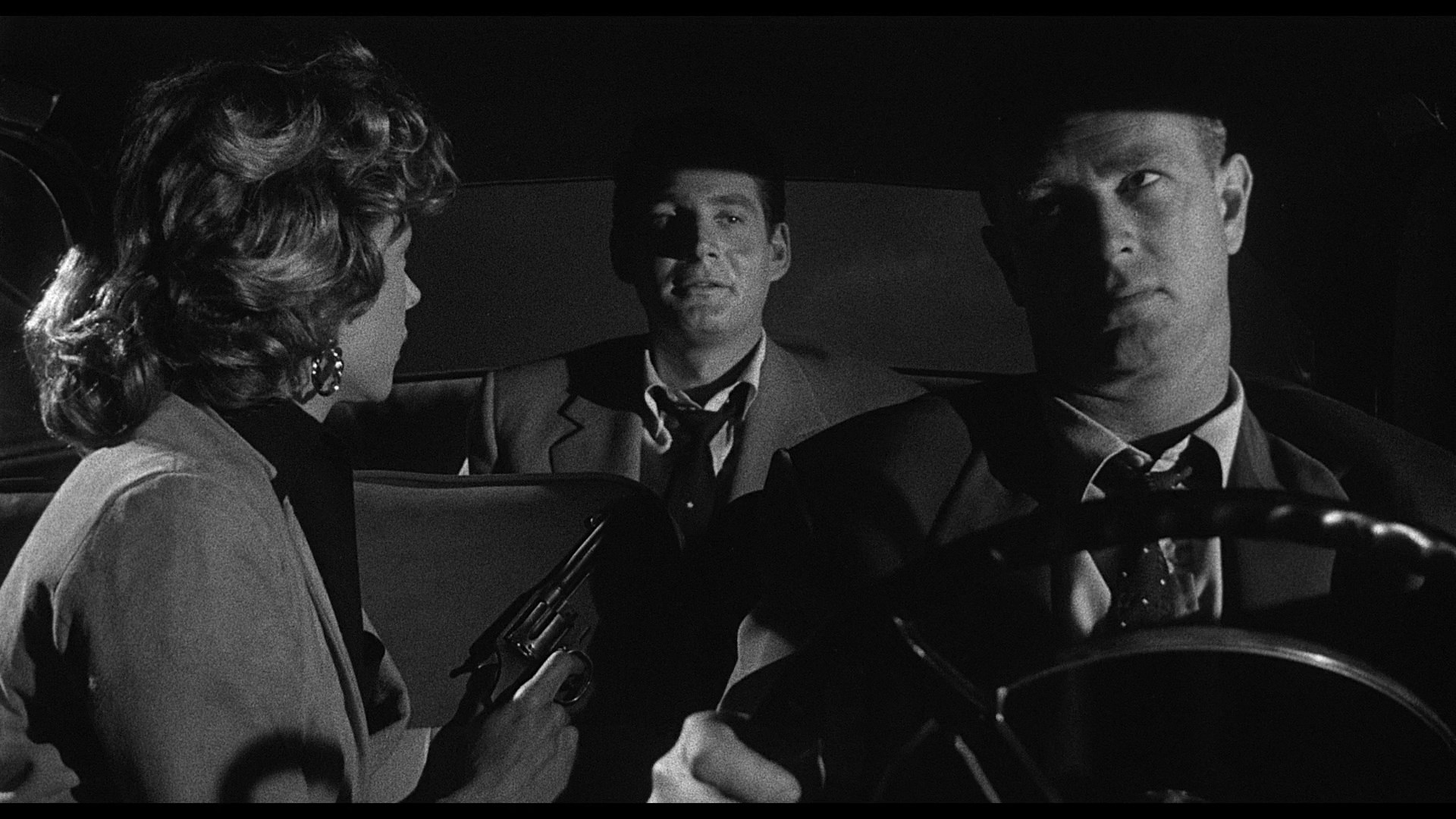 in Sixteen Candles). For some reason this film took a long time to hit home video, getting Blu-ray and DVD releases from Kino Lorber in 2019 featuring a 2K scan commissioned by Universal in 2014, plus the trailer and an audio commentary by Kat Ellinger. It's a very gritty,
in Sixteen Candles). For some reason this film took a long time to hit home video, getting Blu-ray and DVD releases from Kino Lorber in 2019 featuring a 2K scan commissioned by Universal in 2014, plus the trailer and an audio commentary by Kat Ellinger. It's a very gritty, 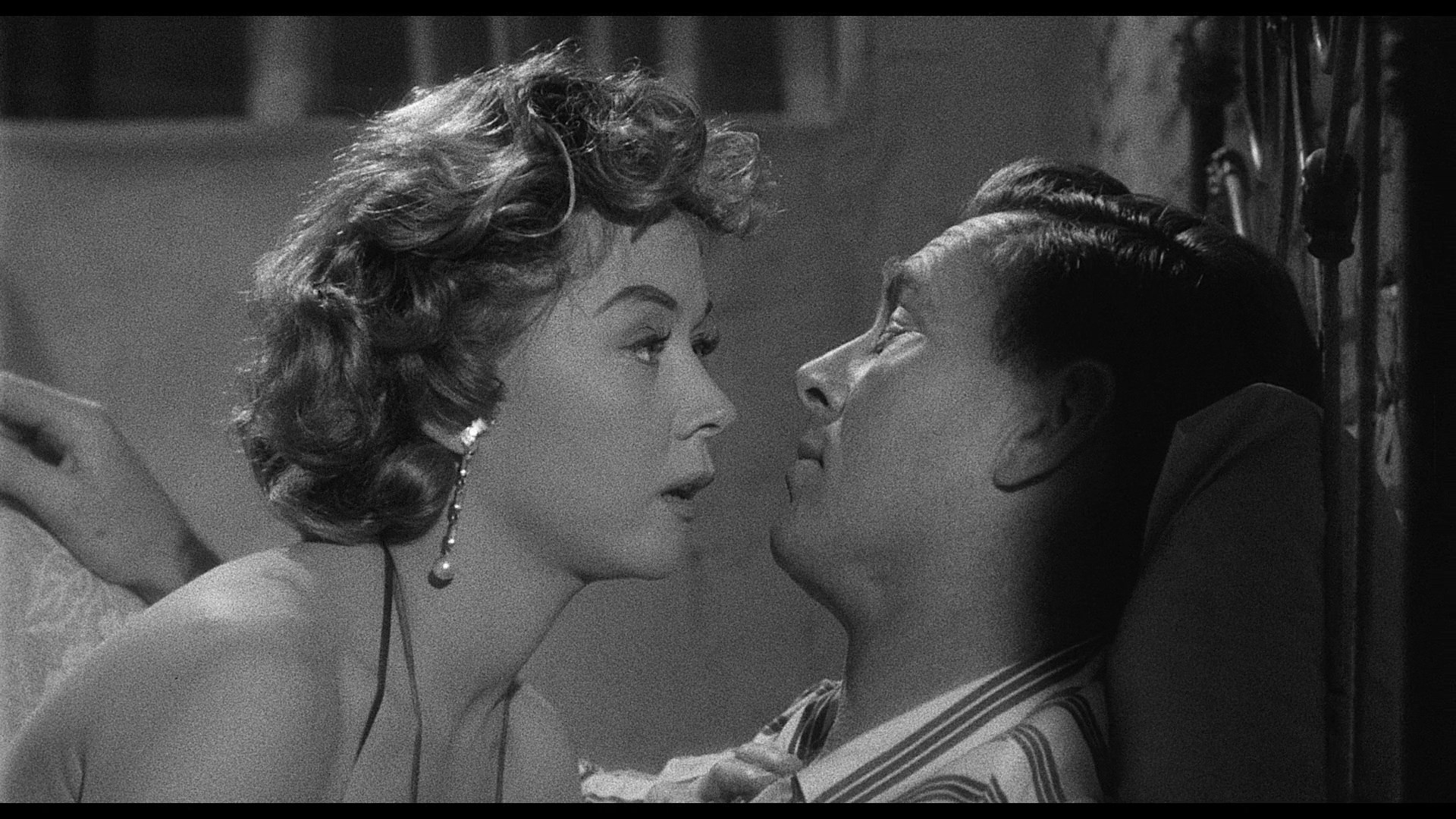 grainy film throughout, and that's how it's presented here with all of its thick textures intact. Like a lot of non-scope films around this time, it was shot full aperture 1.33:1 but framed so it could be shown matted at 1.85:1 (which is how it's presented now) or opened up in older theaters or on TV. This time the Indicator has a commentary by Troy Howarth and this writer (so no evaluation here, obviously!) and "Absolute Magnetism" (41m50s), in which Lucy Bolton takes an extensive look at Grahame's career from vibrant early roles in films like It's a Wonderful Life through her heyday in a string of noir classics, her Oscar-winning role in The Bad and the Beautiful, other key titles like Oklahoma!, and the personal aspects of her life that had a negative impact on her down the line. Also included are the trailer, a 50-image gallery, and 1951's The Cinematographer (9m31s), an Academy of Motion Picture Arts and Sciences documentary short by Naked Alibi director Jerry Hopper about the equipment, training, and process required to be a director of photography on a studio production.
grainy film throughout, and that's how it's presented here with all of its thick textures intact. Like a lot of non-scope films around this time, it was shot full aperture 1.33:1 but framed so it could be shown matted at 1.85:1 (which is how it's presented now) or opened up in older theaters or on TV. This time the Indicator has a commentary by Troy Howarth and this writer (so no evaluation here, obviously!) and "Absolute Magnetism" (41m50s), in which Lucy Bolton takes an extensive look at Grahame's career from vibrant early roles in films like It's a Wonderful Life through her heyday in a string of noir classics, her Oscar-winning role in The Bad and the Beautiful, other key titles like Oklahoma!, and the personal aspects of her life that had a negative impact on her down the line. Also included are the trailer, a 50-image gallery, and 1951's The Cinematographer (9m31s), an Academy of Motion Picture Arts and Sciences documentary short by Naked Alibi director Jerry Hopper about the equipment, training, and process required to be a director of photography on a studio production. ![]()